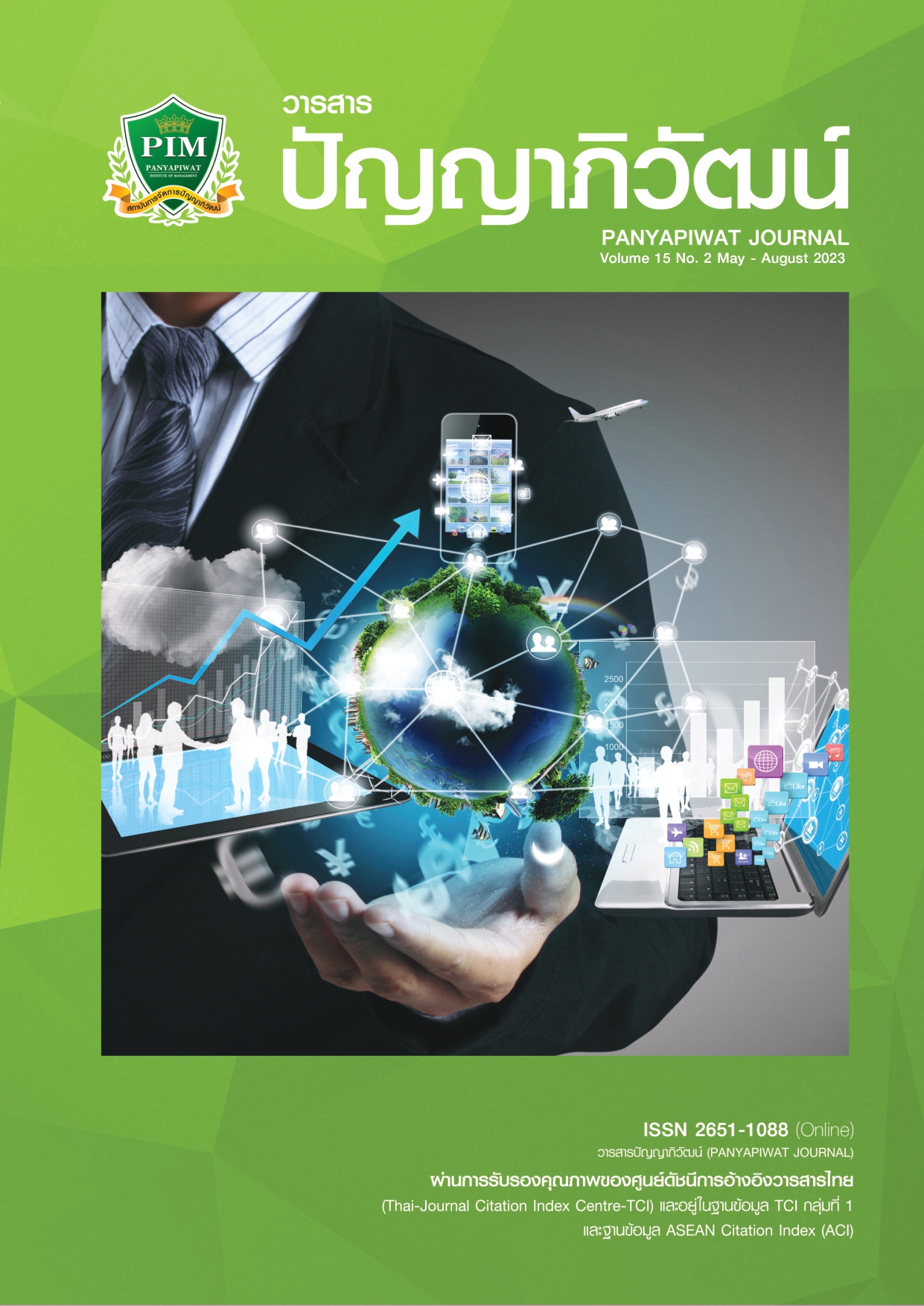ปัจจัยการตลาดกับการยอมรับเทคโนโลยีต่อความตั้งใจซื้อผ่านสื่อสังคมออนไลน์ของนักศึกษากลุ่มเจเนอเรชันซี ในเขตกรุงเทพมหานคร
Main Article Content
บทคัดย่อ
การวิจัยนี้มีวัตถุประสงค์เพื่อศึกษา 1) ระดับการยอมรับเทคโนโลยีการซื้อผ่านสื่อสังคมออนไลน์ 2) ความสัมพันธ์ระหว่างปัจจัยการตลาดกับการยอมรับเทคโนโลยี 3) การยอมรับเทคโนโลยีที่มีผลต่อความตั้งใจ ซื้อผ่านสื่อสังคมออนไลน์ของนักศึกษากลุ่ม Generation Z ในเขตกรุงเทพมหานคร กลุ่มตัวอย่างจากนักศึกษา ปริญญาตรีในเขตกรุงเทพมหานครจำนวน 600 ตัวอย่าง โดยใช้แบบสอบถามออนไลน์ สถิติที่ใช้ประกอบด้วย ค่าเฉลี่ย ส่วนเบี่ยงเบนมาตรฐาน ไคสแควร์ สัมประสิทธิ์สหสัมพันธ์ของเพียร์สัน และการวิเคราะห์ถดถอยพหุคูณ ผลการวิจัยพบว่า 1) การยอมรับเทคโนโลยีในการซื้อผ่านสื่อสังคมออนไลน์อยู่ในระดับมากที่สุด ได้แก่ ด้านการรับรู้ ประโยชน์ด้านความง่ายในการใช้งาน และด้านความเข้ากันได้ 2) ปัจจัยทางการตลาดมีความสัมพันธ์ทางบวก ในระดับสูงกับการยอมรับเทคโนโลยี คือ ด้านกระบวนการและด้านลักษณะทางกายภาพ และ 3) การยอมรับเทคโนโลยีที่มีอิทธิพลต่อความตั้งใจซื้อสินค้าผ่านสื่อสังคมออนไลน์ ได้แก่ การรับรู้ความเข้ากันได้ การรับรู้ ความไว้วางใจ และการรับรู้ความเสี่ยง ตามลำดับ ดังนั้นผู้ประกอบการควรออกแบบสื่อสังคมออนไลน์ให้มีรูปแบบที่เหมาะสมและสะดวกต่อการใช้งานกับผู้ซื้อ มีสินค้าที่หลากหลาย มีคุณภาพ น่าไว้วางใจ และมีระบบที่มีความปลอดภัยและน่าเชื่อถือ รวมถึงออกแบบระบบให้มีขั้นตอนการซื้อและการชำระเงินที่ง่าย รวดเร็ว ปลอดภัยและน่าเชื่อถือ มีการออกแบบร้านค้าที่น่าดึงดูดใจและใช้งานได้ง่าย
Article Details

อนุญาตภายใต้เงื่อนไข Creative Commons Attribution-NonCommercial-NoDerivatives 4.0 International License.
“ข้าพเจ้าและผู้เขียนร่วม (ถ้ามี) ขอรับรองว่า บทความที่เสนอมานี้ยังไม่เคยได้รับการตีพิมพ์และไม่ได้อยู่ระหว่างกระบวนการพิจารณาลงตีพิมพ์ในวารสารหรือแหล่งเผยแพร่อื่นใด ข้าพเจ้าและผู้เขียนร่วมยอมรับหลักเกณฑ์การพิจารณาต้นฉบับ ทั้งยินยอมให้กองบรรณาธิการมีสิทธิ์พิจารณาและตรวจแก้ต้นฉบับได้ตามที่เห็นสมควร พร้อมนี้ขอมอบลิขสิทธิ์บทความที่ได้รับการตีพิมพ์ให้แก่สถาบันการจัดการปัญญาภิวัฒน์หากมีการฟ้องร้องเรื่องการละเมิดลิขสิทธิ์เกี่ยวกับภาพ กราฟ ข้อความส่วนใดส่วนหนึ่งและ/หรือข้อคิดเห็นที่ปรากฏในบทความข้าพเจ้าและผู้เขียนร่วมยินยอมรับผิดชอบแต่เพียงฝ่ายเดียว”
เอกสารอ้างอิง
Alfadda, H. A., & Mahdi, H. S. (2021). Measuring students' use of zoom application in language course based on the Technology Acceptance Model (TAM). Journal of Psycholinguist Research, 50, 883-900. https://doi.org/10.1007/s10936-020-09752-1
Aulia, S. A., Sukati, I., & Sulaiman, Z. (2016). A review: Customer perceived value and its dimension. Asian Journal of Social Sciences and Management Studies, 3(2), 150-162.
Blythe, J. (2014). Principles & practice of marketing (3rd ed.). SAGE Publication.
Cochran, W. G. (1997). Sampling techniques (2nd ed.). John Wiley & Sons.
Davvetas, V., Ulqinaku, A., & Abi, G. S. (2022). Local impact of global crises, institutional trust, and consumer well-being: Evidence from the COVID-19 pandemic. Journal of International Marketing, 30(2), 73-101. https://doi.org/10.1177/1069031X211022688
Digital Government Development Agency (DGDA). (2021). Statistics of current students in higher education institutions classified by educational level and gender. https://data.go.th/dataset/univ_std_11_01 [in Thai]
Do, N. T. T. (2021). Factors leading to online purchase intentions: Customized gifts industry in Denmark. ABAC Journal, 41(1), 100-120.
Electronic Transactions Development Agency (ETDA). (2020). Report on the results of the survey on usage behavior internet in Thailand 2020. http://www.etda.or.th/th/Useful-Resource/publications/Thailand-Internet-User-Behavior-2020_Slides.aspx [in Thai]
Electronic Transactions Development Agency (ETDA). (2021a). ETDA reveals that COVID-19 is a noticeable cause: Gen Z uses the internet the most in the first year, beating Gen Y, the 6-time champion. https://www.etda.or.th/th/pr-news/ETDA-released-IUB-2021. aspx [in Thai]
Electronic Transactions Development Agency (ETDA). (2021b). Value of e-commerce survey in Thailand 2021. https://www.etda.or.th/th/pr-news/ETDA-Reveals-the-Value-of-e-Commerce-in-2021.aspx [in Thai]
Hart, O. A., Nwibere, B. M., & Inyang, B. J. (2015). The uptake of electronic commerce by smes: A meta the retical framework expanding the determining constructs of TAM and TOE frameworks. Journal of Global Business Technology, 6(1), 1-27.
Hataitud, L., Chirinang, P., Fuangchan, S., & Santrakul, K. (2020). Integration of generation Z and the future of cosmetics e-commerce. Journal of Administrative and Management Innovation, 8(2), 128-136. [in Thai]
Hoffman, D. L., Moreau, C. P., Stremersch, S., & Wedel, M. (2022). The rise of new technologies in marketing: A framework and outlook. Journal of Marketing, 86(1), 1-6. https://doi.org/10.1177/00222429211061636
Internet World Stats. (2021). Internet 2021 usage in Asia. https://www.internetworldstats.com/stats3.htm
Kemp, S. (2022). Digital 2022: Thailand. https://datareportal.com/reports/digital-2022-thailand
Kim, S., Sheng, X., & Ketron, S. C. (2022). The roles of legacy versus social media information seeking in American and Chinese consumers' hoarding during COVID-19. Journal of International Marketing, 30(2), 38-55. https://doi.org/10.1177/1069031X221089347
Klaysung, C. (2012). Factor affecting consumer buying decisions about goods on social media in Bangkok. Dhurakij Pundit Communication Art Journal, 15(1), 37-69. [in Thai]
Kongjaroen, W. (2015). Acceptance of in novation factors affecting the satisfaction of mobile banking users in Bangkok metropolitan area [Master's independent study]. Bangkok University. [in Thai]
Kotler, P., Kartajaya, H., & Setiawan, I. (2021). Marketing 5.0: Technology for humanity. Wiley.
Lindgreen, A., Palmer, R., & Vanhamme, J. (2004). Contemporary marketing practice: Theoretical propositions and practical implications. Marketing Intelligence & Planning, 22(6), 673-692.
Manager Online. (2021). 4 consumer trends in the 2022. https://mgronline.com/business/detail/9640000125226 [in Thai]
Manopramote, W. (2015). Factors affecting to goods purchasing decision via social media (Instagram) of people in Bangkok [Master's independent study]. Bangkok University. [in Thai]
Nongyai, P., & Wiroonrath, S. (2019). Guidelines for using marketing mix and social media marketing of small online businesses: A case study of fashion products in the EEC region. Journal of Global Business Review, 21(2), 23-39.
Ooi, K. B., & Tan, G. W. H. (2016). Mobile technology acceptance model: An investigation using mobile users to explore smartphone credit card. Expert Systems with Applications, 59(3), 33-46. https://doi.org/10.1016/j.eswa.2016.04.015
Phothikitti, K. (2021). Factors impacting on online purchasing behavior toward consumers in Bangkok, Thailand. AU-GSB E-JOURNAL, 13(2), 120-126.
Poompruk, C., & Erb-im, N. (2021). Marketing automation: The business success tool for digital marketers. Journal of Management Science Review, 23(1), 221-230. [in Thai]
Punpukdee, A., Wattana, C., Punpairoj, W., Srichuachom, U., Yaklai, P., & Trongtortam, S. (2021). Key factors affecting consumer behavior in the Thailand offline marketing: Research synthesis by systematic literature review and data mining techniques. Journal of Humanities and Social Sciences Thonburi University, 15(2), 21-32.
Puntoni, S., Reczek, R. W., Giesler, M., & Botti, S. (2021). Consumers and artificial intelligence: An experiential perspective. Journal of International Marketing, 85(1), 131-151. https://doi.org/10.1177/0022242920953847
Ranchhod, A., & Gurau, C. (2007). Marketing strategies: A contemporary approach (2nd ed.) Prentices Hall.
Roberts, M. L., & Zahay, D. (2013). Internet marketing: Integrating online and offline strategies. South-Western, Cengage Learning.
Sherman, U. P., & Morley, M. J. (2015). On the formation of the psychological contract: A schema theory perspective. Group & Organization Management, 40(2), 160-192. https://doi.org/10.1177%2F1059601115574944
Solomon, M. R. (2018). Consumer behavior: Buying, having, and being (12th ed.) Pearson Educational.
Unai, E., & Uzun, A. M. (2020). Understanding university students' behavioral intention to use Edmodo through the lens of an extended technology acceptance model. British Journal of Educational Technology, 52(2), 619-637. https://doi.org/10.1111/bjet.13046
Yang, K., Choi, J. G., & Chung, J. (2021). Extending the Technology Acceptance Model (TAM) to explore customer's behavioral intention to use Self-Service Technologies (SSTs) in Chinese budget hotels. Global Business and Finance Review, 26(1), 79-94. https://doi.org/10.17549/gbfr.2021.26.1.79


